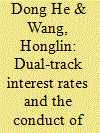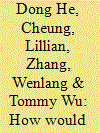| Srl | Item |
| 1 |
ID:
116515


|
|
|
|
|
| Publication |
2012.
|
| Summary/Abstract |
China has a dual-track interest-rate system: bank deposit and lending rates are regulated while money and bond rates are market-determined. The central bank also imposes an indicative target, which may not be binding at all times, for total credit in the banking system. We develop and calibrate a theoretical model to illustrate the conduct of monetary policy within the framework of dual-track interest rates and a juxtaposition of price- and quantity-based policy instruments. We show the transmission of monetary policy instruments to market interest rates, which, together with the indicative credit target in the banking system, ultimately are the means by which monetary policy affects the real economy. The model shows that market interest rates are most sensitive to changes in the benchmark deposit interest rates, significantly responsive to changes in the reserve requirements, but not particularly reactive to open market operations. These theoretical results are verified and supported by both linear and GARCH models using daily money and bond market data. Overall, the findings of this study help us to understand why the central bank conducts monetary policy in China the way it does, using a combination of price and quantitative instruments with differing degrees of potency in terms of their influence on the cost of credit.
|
|
|
|
|
|
|
|
|
|
|
|
|
|
|
|
| 2 |
ID:
116481


|
|
|
|
|
| Publication |
2012.
|
| Summary/Abstract |
In this paper we study the determinants of gross capital flows, project the size of China's international investment position in 2020, and analyze the implications for the renminbi real exchange rate if China liberalizes the capital account. We assume in this exercise that the renminbi will have largely achieved capital account convertibility by the end of the current decade, a timetable consistent with recent proposals by the People's Bank of China. Our analysis shows that if the capital account were liberalized, China's gross international investment position would grow significantly, and inflows and outflows would become much more balanced. The private sector would turn its net liability position into a balanced position, and the official sector would reduce its net asset position significantly, relative to the country's GDP. Because of the increasing importance of private sector foreign claims and the decreasing importance of official foreign reserves, China would be able to earn higher net investment income from abroad. Overall, China would continue to be a net creditor, with the net foreign asset position as a share of GDP remaining largely stable through this decade. These findings suggest that the renminbi real exchange rate would not be particularly sensitive to capital account liberalization as capital flows are expected to be two-sided. The renminbi real exchange rate would likely be on a path of moderate appreciation as China is expected to maintain a sizeable growth differential with its trading partners.
|
|
|
|
|
|
|
|
|
|
|
|
|
|
|
|